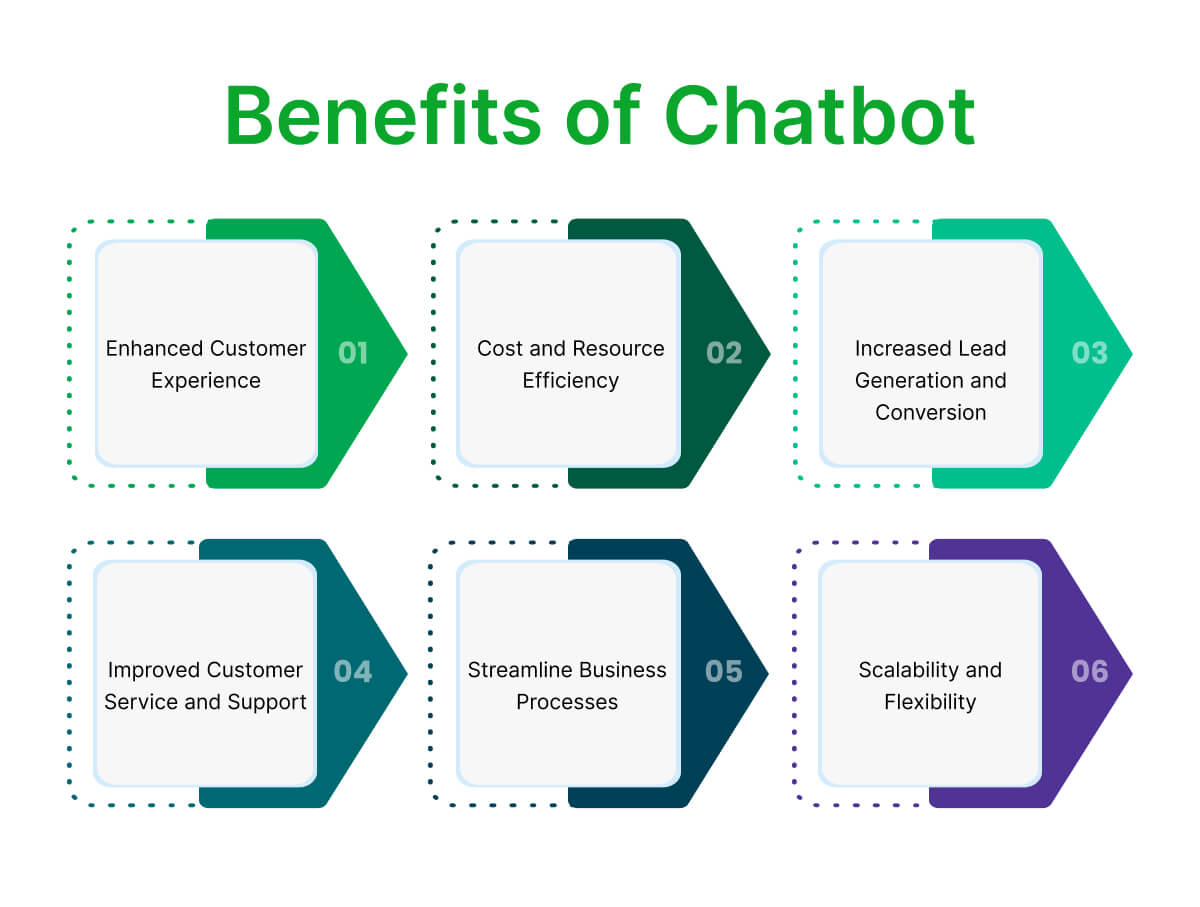 Chatbot
Chatbot

10 July, 2023

Did you know that 80% of businesses want to use chatbots?
Chatbots are software applications using natural language processing (NPL) and artificial intelligence (AI) to understand and respond to human queries. They can help you communicate with your customers, prospects, and employees by providing instant and personalized answers, reducing response time and cost.
In this blog post, we will be discussing the benefits of chatbots in detail. Stay tuned.
Contents

As mentioned earlier, chatbots help you communicate with prospects and customers. Therefore, your customer satisfaction and loyalty increase, and you can generate better leads and sales while improving your employee productivity and engagement.
Here are some extraordinary benefits you can gain by employing chatbots in your business.
The foremost benefit you gain from chatbots is that they can respond 24/7 without missing a beat. Here’s where chatbots excel from human customer service agents. It is impossible for any human to offer 24/7 seamless, instant, personalized, and proactive response.
Advanced analytics and artificial intelligence understand what your prospects and customers are looking for and generate appropriate responses tailor-crafted for them. Also, chatbots are much faster than human agents and can significantly reduce wait times.
Chatbots offer you automated customer support whenever any of your employees, customers, or prospects ask it a question. Therefore, you will need less human intervention while running your business. These chatbots can handle multiple inquiries simultaneously without compromising on accuracy or quality.
As a result, you can lower staffing and operational cost significantly while improving customer satisfaction and retention. Additionally, automated customer support offers consistent and personalized responses based on the customer’s profile and preferences. Thus, you can optimize your resources and enhance performance.
One of the primary goals of any online business is to increase lead generation and conversion, meaning attracting potential customers to your website and turning them into loyal buyers. Customer support chatbots can significantly help in this manner.
These applications identify who are your ideal customers and what pain points they are facing. Based on that, chatbots will tailor the messages and increase the chances of conversion. With the answers and queries, chatbots will guide your customer through the sales funnel and create opportunities to upsell to your customers.
The quality of service and support they receive is a key factor that influences customer satisfaction and loyalty. Offering your customers accurate and consistent information within the shortest moment can help greatly in this manner. Chatbots can help a lot in this manner.
These software applications can access a vast database and find the appropriate answer within seconds. Therefore, chatbots can resolve any common customer issues and inquiries in the shortest possible time.
Moreover, if any query is too advanced for a chatbot to handle, it can seamlessly escalate the question to human agents. Therefore, the customers are satisfied, and the businesses can save a lot of time and effort.
To improve the efficiency, profitability, and productivity of your business, you must streamline business processes. Chatbots can help significantly in this manner. With the help of chatbots, you can handle repetitive tasks and workflows that take a huge amount of time and resources.
Chatbots can be integrated with different systems and applications to run and answer queries seamlessly. Additionally, these applications collect and store customer data when interacting. These data can be analyzed later for insights and to make customer service more effective and efficient.
Last but not least, the benefits chatbots offer a business are scalability and flexibility. As AI-powered software applications, chatbots can handle high volumes of customer inquiries. They can answer multiple questions from multiple users simultaneously without compromising quality or response time.
Chatbot applications can handle different volumes and types of customer requests at any time of the day or night. You can use this software as a new first line of support or supplement support during peak periods.
Additionally, you can integrate chatbots on different channels like your website and social media channels to handle customer queries. They can support multiple languages and can respond accordingly.
With global popularity in various different industries, chatbots also come with several challenges and risks related to privacy and security. Here are the primary privacy and security concerns that business owners should know while using chatbots and how to address them.
However, this data can also be exposed to unauthorized access, misuse, or theft by third parties, malicious chatbots, or hackers. Thus, it needs to be ensured that the data collection and storage practices are transparent, lawful, and secure.
Users should have the right to know what data chatbots are collecting and how it is used and protected. Proper data encryption, anonymization, and deletion need to be followed when handling user data.
However, data sharing poses serious privacy and security risks if the user is not aware of or does not consent to the data sharing. Thus, data-sharing practices need to be clear, ethical, and respectful. Users should have the right to control what data is shared with whom and for what purpose.
However, it can harm user privacy and security if the user is not aware of or does not agree to the chatbot’s identity or intention. Therefore, it needs to be ensured that the chatbot’s intention and identity are honest, appropriate, and authentic.
Users have the right to know who they are talking to and what they are talking about. Therefore, it is crucial to disclose the chatbot’s identity and purpose and avoid misleading or manipulating users.
When you are choosing a chatbot for your business, make sure to follow these guidelines. This will ensure that your chatbots are beneficial, safe, and trustworthy.
While chatbots offer several benefits and immense opportunities, they are not perfect. Chatbots still have several limitations that you need to consider before integrating them. Here are some primary challenges you may face.
For example, a chatbot may not be able to handle sarcasm, humor, irony, or slang. This can lead to frustration of confusion for the user while affecting interaction quality.
For example, a chatbot designed to show weather reports will not be able to process questions about sports. Moreover, some tasks may need human intervention or expertise, like verifying identity, dispute resolving, or offering emotional support.
As chatbots become popular, they are now being designed for different industries rather than being generic. Thus, different industries can utilize this amazing technology for several purposes. Here are some industry-specific benefits that chatbots can offer:
In today’s highly digitized world, chatbots have revolutionized the way businesses and organizations interact with their customers. With the continuous advancements in AI and NLP technologies, chatbots have evolved from basic automated messaging agents to more sophisticated conversational virtual assistants. The future of chatbots promises to bring about even more exciting innovations and features that aim to improve customer experience and streamline business operations.

One of the most significant future trends of chatbots is the integration of voice-activated chatbots and VA technology. This innovation will allow customers to interact with chatbots through voice commands, making the experience more natural and intuitive. This development will allow businesses to provide 24/7 customer support with ease, and customers can get their queries answered even without typing a single word.
Another area where chatbots will continue to show benefits and features is through smart devices and IoT integrations. This advancement allows chatbots to connect to smart home devices like Alexa and Google Home, enabling users to do a wide variety of tasks conveniently. From turning on the lights to ordering food delivery, chatbots connected to smart devices will provide customers with even more personalized experiences, creating more loyal customers.
Lastly, the future of chatbots in marketing will continue to be revolutionary. Today, businesses are leveraging chatbots for marketing as they provide personalized and quick responses. In the future, chatbots will become even more intelligent and offer better recommendations leading to higher sales and profits. Businesses can connect chatbots to their marketing automation platforms, allowing them to automate and personalize their customer’s engagement.
In conclusion, the future of chatbots promises to be bright, and businesses and organizations must be ready to take advantage of this trend to effectively meet their customer’s needs. With the constant advances in AI and NLP technologies, voice-activated chatbots, smart devices, and IoT integrations, and the possibilities of chatbots in marketing, the future of chatbots is undoubtedly one to look forward to. Chatbots are here to offer businesses and customers personalized and optimized solutions, creating a mutually beneficial relationship between the